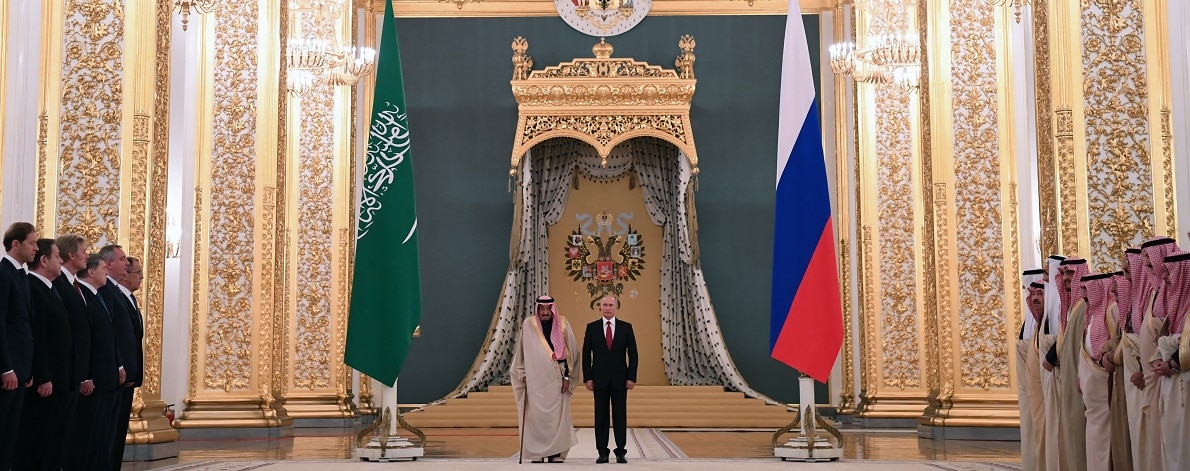“Historical” and “strategic”. This was how Saudi King Salman’s state visit to Moscow, in early October, has been described by the Arabic and Russian press in celebration of the diplomatic rapprochement between the two countries. However, political reconciliation still remains far from being reached.
As it stands, this has been more a matter of establishing an economic cooperation than of achieving strong ideological alliance. Nonetheless, a sense of contentment, for Riyadh and Moscow alike, is well justified.
Due to troublesome historical relationships, a Saudi king had never visited neither the Soviet union nor the Russian Federation until now.
Meeting points
Energy policy, regarding oil, is what Russia and the Saudi Kingdom are currently most in alignment on: the agreement reached to reduce crude production by 1,8 million barrels per day, signed by all the OPEC (Organization of Petroleum Exporting Countries) member States in December 2016, with the support of other ten non-OPEC nations, could be renewed beyond the expected deadline (March 2018) by virtue of Russian-Saudi joint efforts.
On this issue, paradoxically, Riyadh is more in line with Moscow than with the Emirates: according to the IEA (International Energy Agency), Abu Dhabi – along with Algiers, Baghdad, Tripoli – is exceeding its production limits on a regular basis. President Vladimir Putin and King Salman have agreed on going about stabilizing the hydrocarbon market, thus acting tenaciously on ‘non-aligned’ countries.
Nonetheless, it is on the process of a new Saudi armament that the two nations are forming unprecedented ties: thanks to a recent preliminary contract, Riyadh will be buying $3 billion worth of weaponry and defense systems from Moscow.
Furthermore, Russia will shortly begin manufacturing weapons in Saudi Arabia: this entails helping the Kingdom in eventually developing its own armament industry, as envisaged in Saudi Arabia’s “Vision 2030”. This plan to reduce dependence on oil revenues, thus diversifying its economy, is the proud conception of crown prince Mohammad bin Salman.
Overcoming divergences
The Syrian and Yemeni crises, along with their ideological burdens, still weigh on the normalization process of Saudi-Russian relations. Egypt is currently acting as a mediator in reaching appeasement between Moscow and Syria, but it is unclear if Russia will allow for opposition representatives (faithful to Saudi Arabia) to take seat in the future Syrian government.
Nevertheless, on the topic of the war in Yemen, president Putin has so far abstained from articulating an official stance – both Moscow and Riyadh consider the easing of international tension to be fundamental in stabilizing their own internal political landscapes. For this very reason, crown prince Mohammad bin Salman, who has been working towards Saudi-Russian reconciliation for two years now, is convinced that “the relationship between Saudi Arabia and Russia is going through one of its best moments”, as declared in Moscow in May, during one of his diplomatic trips.
In particular, for King Salman and his impetuous son, it is essential, after five years of catastrophic foreign policy, to restore prestige at home. By revamping the economy and reinstating regional leadership, the expected transition will be accomplished successfully: according to persistent rumors, Mohammad bin Salman could be Saudi king even by the end of 2018.
As for Moscow, standing equally between Sunni and Shi’a, as champions of the war-torn Middle East, political victory on the U.S. administration is imminent: whilst Donald Trump’s strategy is to openly demonize the opponent, Russian diplomacy is increasingly concentrating on appeasing frictions.
Without a doubt, Russian authorities have interests in the forthcoming privatization of Saudi Aramco announced to take place in 2018. On the other hand, Saudi investments in Russia are expecting to flow in abundance following Salman’s state visit.
Anyway, overlooking ideologies in the name of pragmatism, Russia and Saudi Arabia are shaping a new Middle East. To which Western diplomacies remain inattentive.
Credit: Yuri Kadobnov/ POOL / AFP


